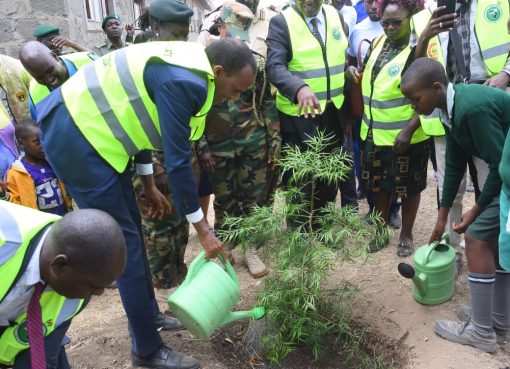Government is moving towards commercialisation of BT maize after the last stretch of open field trials were concluded.
The TELA Bt maize variety if adopted can help farmers double their yields.
Speaking today during an open field trial for Bt Maize in Thika, Agriculture and Crops Principal Secretary Prof. Hamadi Boga said the country is just a step away towards commercialisation of Bt Maize.
The PS noted that already the commercialisation of Bt Cotton has already gone through the field trials and approved by relevant stakeholders including the Cabinet.
“We are making our case with the Bt Maize and its evident you cannot compare the Bt Maize with Non-Bt. We do not want to put farmers through the challenges and we have a good case”, he said
He explained that through this last trial that is being undertaken by KEPHIS, there is data to show it and it is the one that stakeholders will use in order to move to commercialisation of the new variety and allow farmers to earn more
“Because of infestation of pests, our farmers struggle with drought, low soil moisture and carbon thus have yield gap of an average of 1.5 tonnes for per hectare against a global target of 4.9 tonnes per hectare then this is a lost which we can mitigate with the adoption of this technology”, the PS said.
Attempts to improve plant production, Prof. Boga said is global and with systems improved more can be produced with less even as countries address the feeding of the growing population
“Addressing the yield gap is key to the food and nutrition pillar but also production of farmers and support agro- processing”, he said adding that if the country was to move from 1.5 to around 4 the country will be able to double the amount of maize, we get from 42 million to 80 million without even increase the area of production.
This is the smart and climate market thing to do and we are keen that the technology is embraced by farmers, he added saying that once approved all the relevant bodies, the ministry will be able to approve the release of the variety and then its taken to cabinet with a compelling case to await approval.
Kenya, he noted is still low in terms of production of maize in the region with around countries such as Uganda and Tanzania being ahead of us and also Ethiopia who are current doing well around 4.5 metric tonnes per hectares.
“we are pushing for adoption of a better variety, people normally cling to what is familiar and therefore this will require sensitization through champion farmers under the model Village Based Advisors (VBA) who use their plots as demo places for a touch and feel for farmers “, Boga said
The African Agricultural Technology Foundation (AATF) Dr. Dennis Kyetere said that current South Africa is ahead of the other African countries since they started the Bt technology early.
However, Kenya is following suit and is ahead of other countries who are at different levels and what it now needs to convince and show evidence that the technology works, will bring value and contribute to food security.
“we are working in also other number of crops but Maize for Africa is an important crop that feeds over 300 million people”, he said adding on the need to have all technologies available both conventional and non-conventional.
KALRO Maize Breeder and the Lead in the Bt Maize research, James Karanja said after various trials which started in 2013 to date, the results are obvious that the maize that is pest protected and drought tolerant has minimal damage.
“This technology will help farmers move away from the 7 bags they get from an acre to more than 20 bags that will see the country realise more than 50 bags in a year which is enough to feed the country, save from imports and health hazard chemicals”, he added
He further said that if the technology is approved once all the regulatory agencies namely NBA, KEPHIS and NEMA approve the trials, farmers will in the next few years start growing the variety since studies do not lie and the technology is safe.
“This is the safest technology, considering a lot of people and stakeholders have been involved, compared to conventional, and this being the last trial being run by KEPHIS once validated they will see its true and if they make recommendations, the next level of government should take the approval and have farmers have it before end of year”, he said
So far Karanja said that the countries involved in the Bt Maize are South Africa, Mozambique, Uganda, Tanzania, Nigeria, Ethiopia and Kenya and South Africa being used as a benchmark since they already commercialised and grown the maize for decades with 85 percent of their maize being Bt.
“Ethiopia and Nigeria joined the trials just a year ago but have moved fast and for Nigeria who have already approved the Bt Cotton and Bt Cow pea they now want to adopt the Bt maize by end of year while Ethiopia who have equally approved Bt Cotton want in the next two years to commercialize the BT Maize” Karanja said and emphasising that the two countries are using Kenyans Data to do their trials.
For Kenya, he explained that the work is done and has demonstrated through the trials that the new varieties are doing well. “We are hoping and looking forward to relevant government agencies to approve the technology.
The Insect pest in maize production in the country sees an annual yield loss of around 4.7 million bags of maize but with the innate insect pest resistance and drought tolerant disease, Karanja says the country can realise seasonal maize production target of around 52 million bags per year.
The last phase of the trials according to the scientists projections is at the end of March KEPHIS will do a data analysis that will be forwarded to the NPT Committee by April. National Bio Safety (NBA) will approve for Market at the end of April before it moves to the National Variety Release Committee (NVRC) by May and then commercialisation by June 2021.
Karanja noted the major challenge to approval of the Bt Maize still remains the ban imposed on 2012 on importation and consumption of Genetically Modified Foods (GMO) and called for support of the release BT maize once the NPTC, NBA and NVRC have made recommendations on the same in order to boost food security and delivery of the big four agenda.
“There is a need to also support immediate adoption of Bt Maize by farmers to accelerate production by 2021”, Karanja said.
Biotech crops are the fastest adopted crop technology and since 1996 with 1.7 million ha planted then, In 2019, the number has jumped to 29 countries representing 190.4 ha which is 112percent folds.
Wangari Ndirangu





